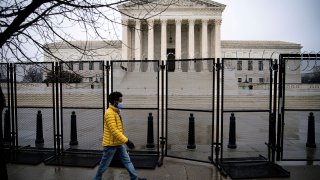
- The Supreme Court said that it will hear a plea from the Republican attorney general of Kentucky to allow him to defend a state law restricting a type of abortion procedure frequently targeted by conservatives.
- The bill, known as HB 454, regulates "dilation and evacuation," a common abortion method often used in the second trimester. It passed in 2018.
The Supreme Court said Monday that it will hear a plea from the Republican attorney general of Kentucky to allow him to defend a state law restricting a type of abortion procedure frequently targeted by conservatives.
Anti-abortion advocates have hoped that the Supreme Court, which now has a 6-3 majority of Republican-appointed justices, will curtail past cases expanding the right to abortion.
The Kentucky case, however, is over a more narrow legal issue and is unlikely to have broader ramifications on laws affecting reproductive rights.
Get New England news, weather forecasts and entertainment stories to your inbox. Sign up for NECN newsletters.
The bill, known as HB 454, regulates "dilation and evacuation," a common abortion method often used in the second trimester. It passed in 2018.
Kentucky's only licensed abortion clinic, EMW Women's Surgical Center, challenged HB 454. The clinic sued the state's attorney general — who at the time was Democrat Andy Beshear — as well as the state's secretary of health and family services. The health secretary led the defense of the law after Beshear asked to be dismissed as a defendant.
Money Report
A district court struck down the law. That decision was affirmed by the 6th U.S. Circuit Court of Appeals. The appeals court cited the 2016 Supreme Court case Whole Woman's Health v. Hellerstedt. While the case was being argued, Republican Daniel Cameron succeeded Beshear as Kentucky attorney general, and Beshear was elected governor.
Kentucky's health secretary decided not to appeal the case after losing at the 6th Circuit. Cameron attempted to intervene in the case in order to do so, but the appeals court rejected his effort, reasoning that he was too late.
In his petition with the justices, Cameron argued that the appeals court's rejection of his effort "is an affront to state sovereignty."
"The Sixth Circuit closed the courthouse doors to the very person that Kentucky law empowers to represent the Commonwealth's interests in court," Cameron wrote in the filing.
Cameron also argued that an appeal was likely to succeed as a result of the Supreme Court's decision in June Medical Services v. Russo in 2020. June Medical Services may have limited the scope of the court's earlier decision in Whole Woman's Health.
EMW Women's Surgical Center, represented by the American Civil Liberties Union, had urged the justices not to take the case.
In a legal brief, the clinic wrote that the attorney general "had previously agreed to be dismissed from the case and to be bound by the judgment" and "could have sought to intervene earlier."
The clinic added that while the case was tangentially related to abortion, it was not an abortion dispute.
"While the merits of this case concern the constitutionality of an abortion law, the issue presented by this petition is only whether a motion to intervene was timely filed," it wrote.
The Supreme Court will consider the case in its term beginning in the fall, and a decision is likely to come by the summer of 2022.
The case is Daniel Cameron v. EMW Women's Surgical Center, No. 20-601.






